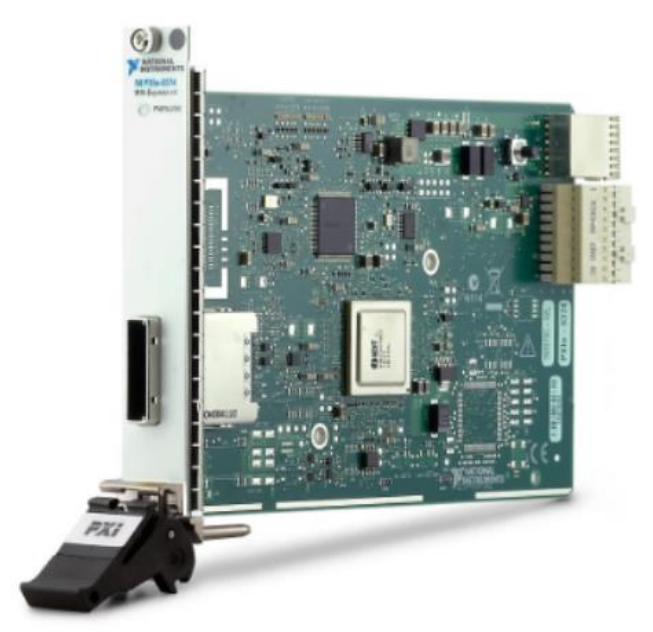Each USRP RIO has a Cabled PCIe Gen 1 x4 port on the back of the device. Typically, copper PCIe cables are used for this connection.

However, any USRP RIO with a PCB version G or later also supports the fiber connections. For time reference, Version G was released around August 2015.
Supported PCIe and PXIe Cards:
It is possible to run a fiber connection to either a PXIe chassis or a PC. However, specialized PXIe and PCIe cards are needed. NI has several PXIe/PCIe interface cards in its portfolio, such as the PXIe-8375 and PCIe-8375, which are designed for fiber connections. However, these modules use a different type of connector than USRP RIO. The possibilities for PXIe and PCIe fiber connectivity with individual devices are discussed below:
PXI Express Module
The PXIe-8374B (Part #: 784308-01, now discontinued) is the PXI Express module to use for fiber PCIe/MXIe connections. This module is a variant of the PXIe-8374, but only the "B" version will work with fiber.
Note: The PXIe-8374B, sometimes referred to as PXIe-8374 for USRP is now end of life and no longer sold by NI.

PCI Express Card
NI does not sell a PCI Express card that is compatible with fiber and the USRP RIO. However, third-party vendors sell cards that may work.
PCI Express/MXIe Cable
NI does not sell a fiber PCI Express cable that has the correct connector for USRP RIO. However, third-party vendors do sell the correct cable (a fiber PCIe Gen 1 x4 cable with the cabled PCIe connector).
MIMO Connectivity for USRP RIO over fiber optic:
Many applications desire multiple USRP RIO devices connected to the host PC or PXIe chassis using fiber optic. CPS-8910 switch box is typically used for any such requirements using copper MXIe cables. This switch box also supports fiber, but with some restrictions as discussed below.
CPS-8910 Overview
The CPS-8910 has upstream and downstream connections. The upstream connection is from the switch box to the PC or PXI chassis host. There are two upstream connectors -- a Gen 2 x8 connection and a Gen 1 x4 connection. Only one can be used at any time. The downstream connections are from the switch box to each USRP RIO. There are eight downstream connections--all Gen 1 x4 connections.
Upstream Connections
Both upstream connections on the CPS-8910 can use fiber. However, just as with connecting directly to a USRP RIO, you must have the correct cable and card for PCIe or PXIe. If you use the Gen 1 x4 connection, your setup would be identical to connecting to a USRP RIO as discussed above. If you are using the Gen 2 x8 connection, the setup is slightly different. First, you will need to use the PXIe 8384 card, with the DIP switch set to the ‘CFC’ position. You will also need to get a different fiber cable. There are two options here. NI sells a Gen 2 x8 fiber cable. This cable will work, but it will only run at Gen 2 x4 speeds. It is also possible to get a true Gen 2 x8 fiber cable from a 3rd party source that can support higher data rates.
Downstream Connections
The downstream connections on the CPS-8910 can also use fiber, but only if the upstream connection is configured to use fiber as well. Note that the upstream connection doesn't have to actually use fiber, it just needs to be configured to do so by using the PXIe-8374B, using a 3rd party card, or by using the PXIe-8384 with the DIP switch change. If the upstream connection is configured to use fiber, you will need to use the specialized third-party PCIe Gen 1 x4 fiber cable to connect to each USRP RIO.
Once the fiber optic connectivity is established, the device can be used in the same way as with copper connectivity.